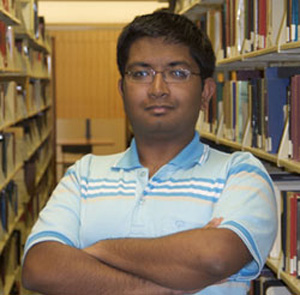Research by Shrutarshi Basu ’11 (Kolkata, India) on software programming was accepted for presentation and publication at the 26th IEEE International Conference on Software Maintenance held Sept. 12-18 in Timișoara, Romania. Basu, who is pursuing a B.S. in electrical and computer engineering and an A.B. with a major in computer science, has worked on different projects over the last two years with Chun Wai Liew, associate professor and head of computer science at Lafayette, and Barbara Ryder, head of the computer science at Virginia Tech.
One of the major benefits of studying at a small undergraduate college is being able to assist professors in their research and getting to know their professional colleagues. During my freshman summer I worked with Professor Liew on a computational art project and as a result developed a strong interest in programming languages which I pursued the next fall.

Shrutarshi Basu '11
Professor Liew introduced me to Dr. Ryder at Virginia Tech. She offered me a research position last summer where I studied performance issues in the Java programming language. The experience was a very helpful opportunity both personally and professionally. I got a chance to look at how research at a big institution works and interacted with people doing cutting-edge research on issues that interest me. I also became good friends with other students pursuing summer research, and we all learned a great deal from each other.
I continued some of the work at Virginia Tech over last fall and continued learning more about the problem and my interests in the area. Our work paid off recently when a paper describing our work was accepted for presentation and publication at the 26th IEEE International Conference on Software Maintenance. This is my first paper to be accepted at a major research conference and the conclusion of a long and enlightening research and learning experience.
Our work centers around a form of software analysis called blended analysis that Dr. Ryder’s group has been studying. Essentially the approach uses data collected during the actual running of a program to inform a later analysis of the program’s source code. Our work looked at how different representations of the collected data affected the analysis as a whole.
My part in the research involved performing the analysis on various programs, collecting the analysis data, and seeing how it changed according to the different representations we used. Along the way, I learned about program analysis, statistics and the practical aspects of computer science research (like how to run jobs across 8-10 machines at a time). I also had the chance to get my hands dirty and make some changes to the tools that we used to perform the analysis and gather our data.
While publishing a paper is a good feeling (and looks great on a resume), the research experience itself was greatly helpful. It certainly helped cement my plans for going to graduate school in computer science and helped me understand where my interests lie. I’m currently pursuing another summer of research with Professor Liew and will definitely be trying to publish more of my work before I graduate.
Basu also presented related research at last year’s National Conference on Undergraduate Research. He has just returned from Italy where he spent three weeks in a course on the art and history of the Renaissance taught by Diane Cole Ahl, Rothkopf Professor of Art History, and Rado Pribic, Williams Professor of Foreign Languages and Literatures. He wrote a blog about his experiences.
